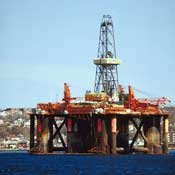With less than one month left in office, Gov. Haley Barbour primed the pump for oil and natural gas drilling to take place off the Mississippi Gulf Coast.
Barbour recently directed the Mississippi Development Authority, which the governor controls, to publish rules about leasing state-controlled waters. He explained how the leases would work during his Dec. 20 budget recommendation talk.
Citing state law, Barbour said that drilling would be prohibited between the mainland and barrier islands and within one mile south of the barrier islands. This, he said, would create a two-mile-wide strip at least 10 miles away from the coast that drilling companies would be able to lease.
Barbour offered assurances that the drilling would be far enough away from the Coast that the drilling rigs would not blight the picturesque seascape.
"If you're on shore, you won't be able to see either one of those, whether they're in federal or state waters," Barbour said.
He indicated that the drilling would boost Mississippi's revenue. Starting in 2017, the federal government receives 65 percent of royalties that companies pay if they discover oil or gas; Mississippi gets the remaining 35 percent of the royalty, Barbour said. If companies were permitted to drill in state-owned waters, however, Mississippi would be able to pocket the full amount of the royalty.
State regulators would allow drilling up to the mainland coast in "a narrow north-south strip" near the state's border with Alabama, which allows drilling right up to the shore, Barbour said.
"There is a high likelihood that they're capturing natural gas that's under Mississippi lands and borders," Barbour said.
"For us in Mississippi, that is very unpopulated, non-developed savannahs and marshes in the very southeast corner of Jackson County."
The drilling controversy highlights a perplexing problem: Mississippi needs a lot of energy but does not produce much energy itself.
In its 2009 energy profile of Mississippi, the U.S Energy Information Administration found "the state has substantial energy resources" but is not "as rich in energy as neighboring Louisiana." The EIA found that Mississippi produces a small amount of crude oil, has minimal natural gas and electric power production "given its high per capita consumption."
Because of the wide use of air conditioners during our sweltering summers, Mississippi ranks third among the states for electricity consumption per capita per average cooling-degree days, which measures the amount of energy needed to cool a home or business.
Steve Shepard, who chairs the Gulf Coast Group of the Mississippi Sierra Club, said that drilling should not be permitted in state waters at all.
"If it were up to me, I wouldn't have any drilling anywhere around here, but obviously, we're willing to compromise; it's Haley Barbour that wants to stick an oil well in everybody's backyard," Shepard said this week.
The governor's announcement about a possible lease sale drew criticism from environmental groups who cited his past relationships with energy companies.
Gov. Barbour's political action committee, Haley's PAC, collected $24,500 from the oil and gas industry in 2010, according to state and federal campaign-disclosure records. Under his chairmanship of the Republican Governors Association, major oil companies like Koch Industries, Exxon Mobil and Devon Energy gave the RGA approximately $2.7 million.
Between his two gubernatorial election campaigns, in 2003 and 2007, employees of oil and gas firms contributed almost $720,000 to Barbour.
Shepard said Mississippi officials should focus on developing tourism along the Coast instead of drilling for fossil fuels.
"Why make everything uglier?" Shepard asked. "We ought to be advocating for people coming here to gamble, coming here to fish, coming here for the beach. They don't need to be looking at a bunch of stinking oil rigs."



Comments
Use the comment form below to begin a discussion about this content.
comments powered by Disqus